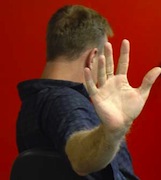 You make a presentation to your boss’s boss. You’ve put a lot of hard work and late nights into the finished product. You’ve even done a dry run before your peers and another in front of your boss. You’ve done your homework, you’ve got it nailed. Your analysis is right on, your recommendation obviously correct, as anyone who has done their homework would recognize.
You make a presentation to your boss’s boss. You’ve put a lot of hard work and late nights into the finished product. You’ve even done a dry run before your peers and another in front of your boss. You’ve done your homework, you’ve got it nailed. Your analysis is right on, your recommendation obviously correct, as anyone who has done their homework would recognize.
You conclude and the CEO opens the floor to comments and questions. That little nerd two departments down the hall who has never liked you starts to pepper you with questions, challenging your premises, calling into question your methodology. You breathe deeply, try to stay calm, yet you feel the anger rising. How dare he? Why is he trying to make you look bad? You respond aggressively, determined to put him in his place, to defend your thesis, to quash the opposition.
As you warm up, you feel the touch of a cautioning hand from your friend on your right but you shrug it off. You are on a roll, fired up, so into it you miss the slight downward hand movement of your boss trying to signal you to tone it down, and a moment or two later when she briefly covers her eyes and gives a slight shake of her head. Thus you are astounded and confused when she breaks in a minute or two later and suggests to the CEO that the item be tabled until the questions raised could be more fully addressed. The CEO holds her gaze for a long moment and then nods acquiesce.
I’ve just described a case of “defensive bristling,” the tendency to react with dismay and even resentment or anger when our ideas are not accepted or are challenged. The stronger the challenge, the easier it is for defensive bristling to kick in, hijacking our emotions before we realize that our brains have checked out and our passions have taken over. At that point, our ability to benefit from the insights of others, the cumulative experience and wisdom that diversity of viewpoints have to offer, is lost. Our unwillingness to be influenced reduces our influence.
Defensive bristling leads to group think and is a form of the not-invented-here syndrome.
As always, awareness is the first step toward solution and I share what I most need and want to learn.
Closing quotes:
“Defensiveness, ultimately, is not about protecting ourselves from other people. People get defensive because they don’t want to experience uncomfortable feelings within themselves. Getting defensive will temporarily block the feelings that they don’t want to experience. The prescription for dealing with your own defensiveness is to let yourself experience those feelings, as uncomfortable as they may be.” — Judge James W. Tamm
“I’ve learned you can make a mistake and the whole world doesn’t end. I had to learn to allow myself to make a mistake without becoming defensive and unforgiving.” — Lisa Kudrow; b. 1963, actress, best known for playing Phoebe Buffay on “Friends”


0 Comments